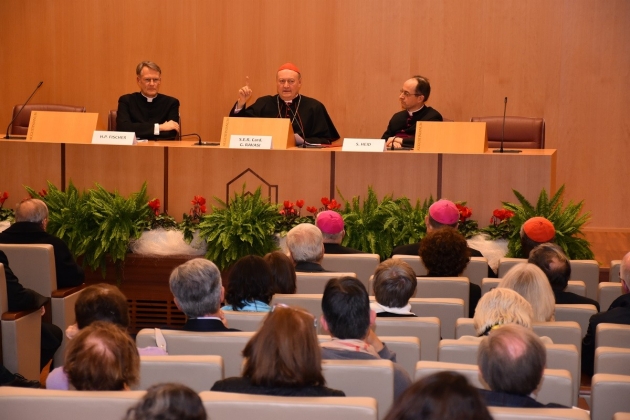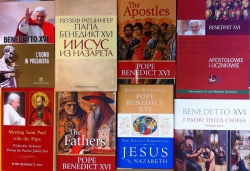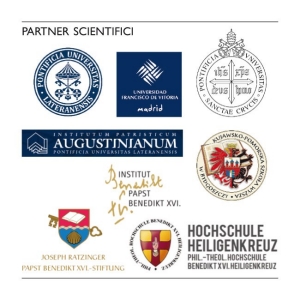JOSEPH RATZINGER-BENEDICT XVI LIBRARY

Entirely dedicated to the life and the thought of the Pope Emeritus as a scholar and a Pontiff, the Joseph Ratzinger-Benedict XVI Library will enrich the historical library of the Pontifical Teutonic College of the Vatican City. The project of the library has been supported by the Roman Institute of the Society of Görres and by the Joseph Ratzinger-Benedict XVI Vatican Foundation. It hosts more than a thousand books in 37 different languages, among which there are German, Italian, English, Spanish and Portuguese. There are also books in Slavonic languages, Japanese, Thai and Turkish. At the same time, the online catalogue of the Library is available on the Urbis Library Network portal, at the following link: www.urbis-libnet.org/vufind/
The books of the Library were donated by Pope Benedict XVI, by the Libreria Editrice Vaticana, by the Vatican Foundation, by the Papst Benedikt XVI Institute of Regensburg and by the authors who wrote on Ratzinger’s life.
The Library was officially opened on 18th November 2015 with the lectio magistralis of cardinal Gianfranco Ravasi, President of the Pontifical Council of Culture, in the main hall of the Augustinian Patristic Institute. Along with the rector of the Pontifical Teutonic College Hans-Peter Fischer and the director of the Roman Institute of the Society of Görres Stefan Heid there were, among others: the cardinals Francis Arinze, Velasio De Paolis and Prosper Grech, the archbishops Georg Ganswein, Gianfranco Girotti and Guido Pozzo, the president of the Vatican Foundation Joseph Ratzinger - Benedict XVI, Msgr. Giuseppe A. Scotti. A lot of people from Chile, Colombia, Germany, Lebanon, Poland and Portugal followed the online web broadcasting of the celebration.
After the lectio magistralis, all people moved to the Pontifical Teutonic College in the Vatican City to visit the Library, that was blessed by Gänswein. The Prefect of the Pontifical Household also showed a special present sent by Pope Ratzinger: a ceramic plate with his coat of arms.
During the opening ceremony of the Library, cardinal Gianfranco Ravasi spoke about three “ideal rooms” sharing the same capital letter B: Bible (Bibbia), Library (Biblioteca), Benedict (Benedetto XVI).
The following is the full text of the speech “From the Bible to the Library – Benedict XVI and the Culture of the Word of God”.
“FROM THE BIBLE TO THE LIBRARY – BENEDICT XVI AND THE CULTURE OF THE WORD OF GOD”
Cardinal Gianfranco Ravasi
È a una metafora architettonica che ricorriamo per ordinare la nostra riflessione su un tema così vasto e polimorfo. Immaginiamo, infatti, di avanzare in tre grandi aule ideali, tracciandone non una descrizione puntuale e completa ma evocandone solo alcune componenti in una sorta di abbozzo o di mappa essenziale. Questo triplice spazio è posto curiosamente all’insegna di una lettera alfabetica, la B di Bibbia, Biblioteca e Benedetto XVI. Ora è significativo che nella lingua biblica, l’ebraico, la bet (ב) graficamente e semanticamente rimanda a una “casa” aperta, all’edificio ideale le cui stanze ora perlustreremo. Dominante sarà la tipologia della biblioteca, che è anche il cuore dell’evento che vogliamo commemorare.
I. La Bibbia, biblioteca di 73 libri
Nel primo spazio simbolico collochiamo la Bibbia. Essa letterariamente e storicamente, come indica l’originale greco Biblia, comprende una piccola biblioteca di 73 libri che cronologicamente si distribuiscono nell’arco di un millennio e vedono l’affacciarsi di mani autoriali e redazionali differenti. Eppure questo plurale greco si è per noi trasformato a livello linguistico, ermeneutico e teologico in un singolare per cui i molti libri formano un Libro, come si è spesso ripetuto e come è stato ribadito dall’approccio interpretativo cosiddetto “canonico”, già praticato dai Padri della Chiesa. È, comunque, indiscutibile che la Bibbia ha spesso la consapevolezza della sua qualità di testo scritto.
Reiterato è, infatti, il lemma “il libro della Legge”, il verbo ebraico ktb, “scrivere” ricorre 204 volte con uno sciame di derivati, così come l’equivalente graphein neotestamentario che risuona 191 volte, mentre il sostantivo graphè 50 volte. Il “libro”, sefer, è presente 185 volte e sofer, lo “scriba” 54 volte, così come le parole bíblos/biblíon echeggiano 44 volte nel Nuovo Testamento. È affrontata persino la questione delicata della traduzione da parte del nipote del Siracide, convinto che «le cose dette in ebraico non hanno la medesima forza quando vengono tradotte in un’altra lingua», come egli afferma nel prologo della versione greca dell’opera di suo nonno.
RATZINGER’S LIBRARY

REALIZED IN COLLABORATION WITH
Biblioteca Joseph Ratzinger – Benedetto XVI
Teutonic Cemetery – 00120 Vatican City State
Students and scholars who are interested in the thought of Joseph Ratzinger – Benedict XVI can go to the Library and consult the books from Monday to Thursday from 15.30 to 19.30. An officer of the Vatican Foundation will guide students during the visit.
In order to register and access the Library, please provide two passport photos.


